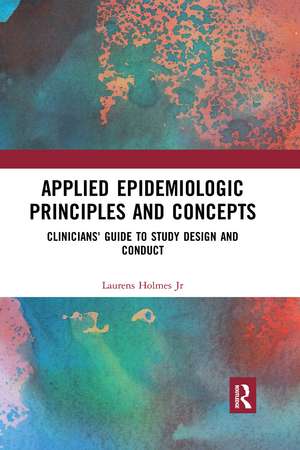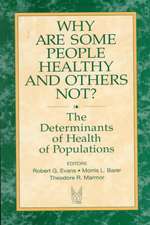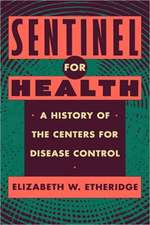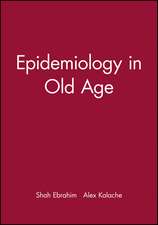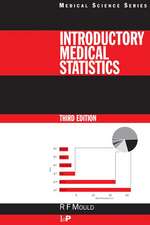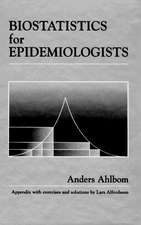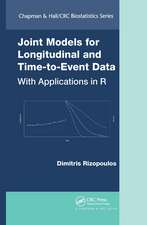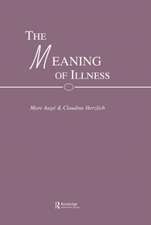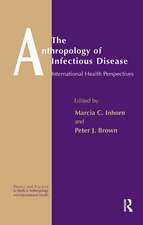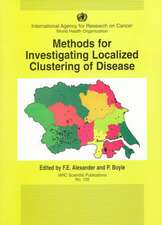Applied Epidemiologic Principles and Concepts: Clinicians' Guide to Study Design and Conduct
Autor Laurens Holmes, Jr.en Limba Engleză Paperback – 31 mar 2021
| Toate formatele și edițiile | Preț | Express |
|---|---|---|
| Paperback (1) | 359.11 lei 6-8 săpt. | |
| Taylor & Francis – 31 mar 2021 | 359.11 lei 6-8 săpt. | |
| Hardback (1) | 1164.33 lei 6-8 săpt. | |
| Taylor & Francis – 21 dec 2017 | 1164.33 lei 6-8 săpt. |
Preț: 359.11 lei
Preț vechi: 378.01 lei
-5% Nou
Puncte Express: 539
Preț estimativ în valută:
68.71€ • 71.95$ • 56.99£
68.71€ • 71.95$ • 56.99£
Carte tipărită la comandă
Livrare economică 09-23 aprilie
Preluare comenzi: 021 569.72.76
Specificații
ISBN-13: 9780367560089
ISBN-10: 0367560089
Pagini: 344
Ilustrații: 77
Dimensiuni: 156 x 234 x 18 mm
Greutate: 0.5 kg
Ediția:Nouă
Editura: Taylor & Francis
Colecția CRC Press
Locul publicării:Oxford, United Kingdom
ISBN-10: 0367560089
Pagini: 344
Ilustrații: 77
Dimensiuni: 156 x 234 x 18 mm
Greutate: 0.5 kg
Ediția:Nouă
Editura: Taylor & Francis
Colecția CRC Press
Locul publicării:Oxford, United Kingdom
Cuprins
Part I
Chapter One Epidemiologic Research Conceptualization
Chapter Two Epidemiologic Proposal Development & Protocol
Chapter Three Epidemiologic Research Challenge: Confounding, and Effect Measure Modifier
Chapter Four Epidemiologic Case Ascertainment: Disease Screening & Diagnosis
Part II Epidemiologic Methods & Concepts
Chapter Five Epidemiologic Methods and the Measures of Disease Occurrence and Association
Chapter Six Epidemiologic Study Designs : Overview
Chapter Seven Ecologic Studies: Design, Conduct & Interpretation
Chapter Eight Case-Control Studies: Design, Conduct & Interpretation
Chapter Nine Cross-sectional Studies: Design, Conduct & Interpretation
Chapter Ten Cohort Studies: Design, Conduct & Interpretation
Chapter Eleven Clinical Trials (Experimental Designs)
Chapter Twelve Epidemiologic Causal Inference in Clinical and Quantitative Evidence Synthesis
Part III Perspectives, Challenges and Future of Epidemiology
Chapter Thirteen Perspectives and Challenges in Epidemiology
Chapter Fourteen Role of Epidemiology in Health and Healthcare Policy
Chapter Fifteen Consequentialist Epidemiology in Clinical & Translational Research
Chapter One Epidemiologic Research Conceptualization
Chapter Two Epidemiologic Proposal Development & Protocol
Chapter Three Epidemiologic Research Challenge: Confounding, and Effect Measure Modifier
Chapter Four Epidemiologic Case Ascertainment: Disease Screening & Diagnosis
Part II Epidemiologic Methods & Concepts
Chapter Five Epidemiologic Methods and the Measures of Disease Occurrence and Association
Chapter Six Epidemiologic Study Designs : Overview
Chapter Seven Ecologic Studies: Design, Conduct & Interpretation
Chapter Eight Case-Control Studies: Design, Conduct & Interpretation
Chapter Nine Cross-sectional Studies: Design, Conduct & Interpretation
Chapter Ten Cohort Studies: Design, Conduct & Interpretation
Chapter Eleven Clinical Trials (Experimental Designs)
Chapter Twelve Epidemiologic Causal Inference in Clinical and Quantitative Evidence Synthesis
Part III Perspectives, Challenges and Future of Epidemiology
Chapter Thirteen Perspectives and Challenges in Epidemiology
Chapter Fourteen Role of Epidemiology in Health and Healthcare Policy
Chapter Fifteen Consequentialist Epidemiology in Clinical & Translational Research
Notă biografică
Professor Laurens Holmes Jr. was trained in internal medicine, specializing in immunology and infectious diseases prior to his expertise in epidemiology-with- biostatistics. He is an advocate of reality in modeling of epidemiologic, clinical and biomedical research data, consequential epidemiology, as well as explanatory ecologic model in understanding the complex etiologies of health and disease. Over the past two decades, Dr. Holmes had been working in cancer epidemiology, control & prevention with substantial publication on hormonally-related malignancies mainly prostate, thyroid, cervical, and testicular. Other areas where his focus had been during the last fifteen years include pediatric malignancy namely ALL, AML, lymphoma, brain and CNS. His involvement in chronic disease epidemiology, control and prevention includes signal amplification and stratification in risk modeling and health disparities in hypertension, and diabetes mellitus with large legacy (preexisting US National Health Statistics Center) data. Professor Holmes is a pioneer of health disparities epidemiology where he presents on disentangling race in epidemiologic studies by re-considering the biologic,bio-molecular, genetic, epigenetic determinants of disease incidence, prevalence, morbidity, prognosis, severity and mortality.
Descriere
This book provides practical knowledge to clinicians and biomedical researchers using biological and biochemical specimen in order to understand health and disease processes at cellular, clinical, and population levels. Concepts and techniques provided will help researchers design and conduct studies, then translate data from bench to clinics.
